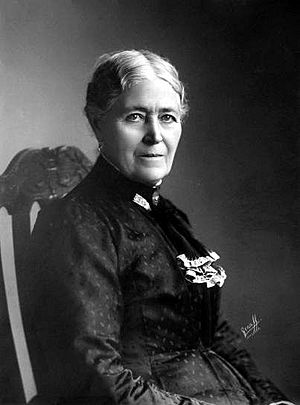Léonie de Waha facts for kids
Léonie de Waha (1836–1926) was an important Belgian woman. She spoke French and worked hard to help others. Léonie was a feminist, which means she believed in equal rights for women. She also loved helping people (a philanthropist) and was a great educator. She was also active in the Walloon Movement, which supported the French-speaking region of Belgium.
Léonie de Waha is famous for helping girls and young women get a good education. She started many schools and libraries. In 1868, she opened a high school for girls in Liège. This school is now called the Athénée Léonie de Waha. She also cared deeply about women's rights. In 1912, she created the Union des femmes de Wallonie (Union of Walloon Women). She led this group until she passed away in 1926.
Contents
Léonie's Early Life
Léonie Marie Laurence de Chestret de Haneffe was born on March 3, 1836. Her birthplace was Tilff, a town in the Liège region of Belgium. Her parents were from noble families. Her father was Hyacinthe de Chestret de Haneffe, a Belgian senator. Her mother was Amanda Laurence de Sélys Longchamps.
Sadly, Léonie's mother died when Léonie was only two years old. She grew up at Colonster Castle with private teachers. She also went to a girls' school in Liège and spent some time in Flanders. In 1863, she married Victor Louis Auguste de Waha-Baillonville. They had a daughter named Louise Amanda. But bad luck continued for Léonie. Her baby daughter died in 1866, and her husband passed away shortly after in 1867.
Her Work and Impact
After becoming a widow, Léonie de Waha decided to dedicate her life to helping women. She wanted to improve education for girls and give women more opportunities. First, she started a tailoring school in Tilff. This taught girls useful skills.
Starting Schools for Girls
In 1868, Léonie opened the "Institut supérieur de demoiselles" (Young Ladies High School) in Liège. She hired excellent teachers for this school. It was a secular school, meaning it wasn't run by a specific church. However, students could choose to have religion lessons from Catholic, Protestant, or Jewish leaders. The school grew very quickly. It needed new buildings, which were designed by architect Jean Moutschen. This school soon became well-known as the Lycée Léonie de Waha.
Supporting Wallonia and Women's Rights
Léonie de Waha was also very interested in local history. In the early 1900s, she became involved with the Walloon Movement. This movement aimed to support the French-speaking region of Wallonia in Belgium. She talked with important leaders like Julien Delaite and Jules Destrée. She supported the idea of dividing Belgium into different regions. These regions would be for the Walloons, the Flemings, and the people of Brussels.
On October 28, 1912, Léonie founded the Union des femmes de Wallonie. At first, this group focused on encouraging women to support Wallonia's cultural traditions. After the First World War, the group's focus changed. It started to work on broader women's rights. These goals included better access to education for women. They also fought for women's right to vote and more job opportunities for women.
Léonie de Waha passed away peacefully at her home in Tilff on July 8, 1926. She was 90 years old.
See also
 In Spanish: Léonie de Waha para niños
In Spanish: Léonie de Waha para niños
 | Sharif Bey |
 | Hale Woodruff |
 | Richmond Barthé |
 | Purvis Young |


